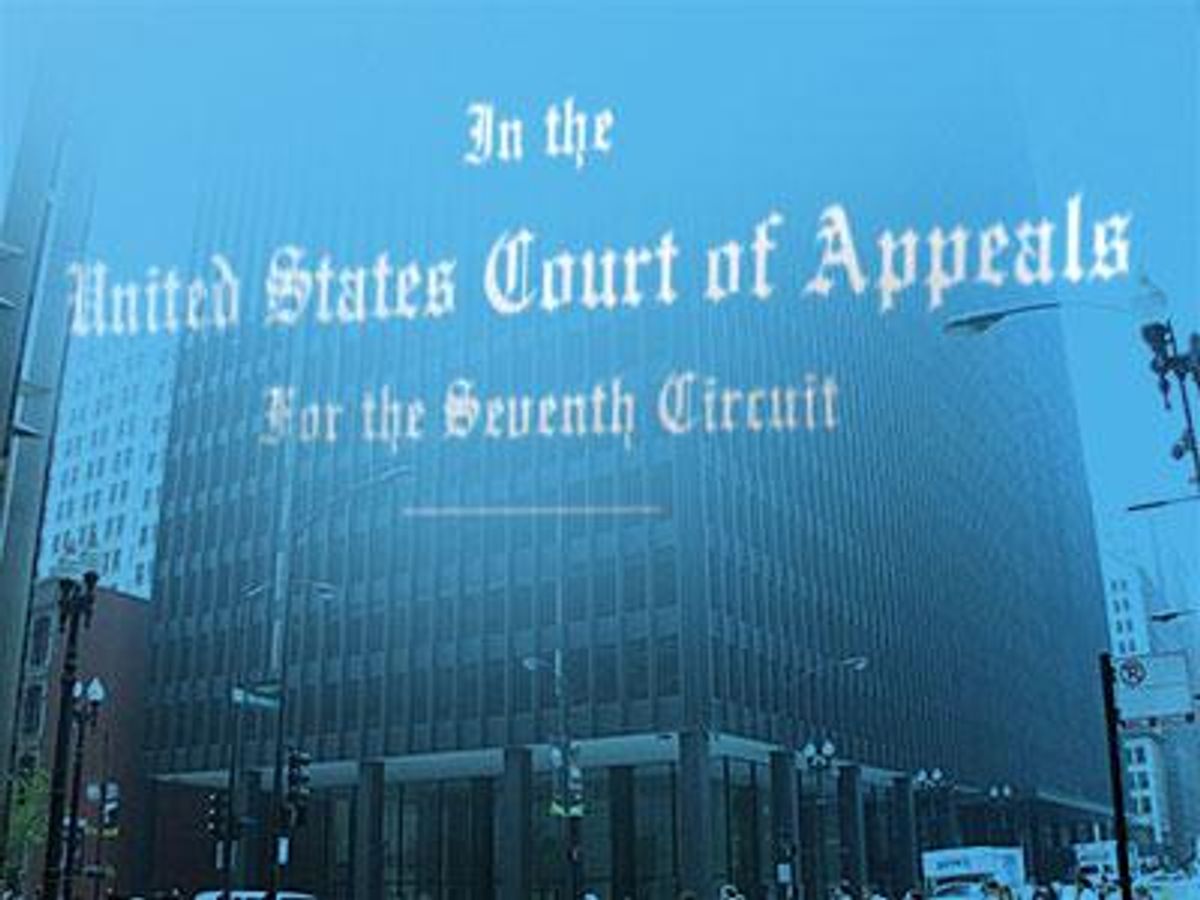On Tuesday, attorneys for Indiana and Wisconsin did their best to justify antigay marriage bans in each state, but encountered stiff resistance from a three-judge panel at the Seventh Circuit Court of Appeals in Chicago.
Judge Richard Posner (a Reagan appointee) was joined by Judges David Hamilton (an Obama appointee) and Anne Claire Williams (a Clinton appointee) in firing tough, often combative questions at state lawyers. Full audio of both hearings is available here -- but read on for the the highlights that already have equality advocates nationwide talking.
Indiana Solicitor General Thomas Fisher bore the brunt of the judicial skepticism. In the exchange below, Judge Posner challenged Fisher to justify the state's marriage ban. Fisher avoided the question and claimed, to Posner's increasing exasperation, that the ban decreases the likelihood of unintended pregnancies. The judge's comments appear in bold, while responses from attorneys are presented in plain text:
Fisher: The issue here is to deal with what may be a fleeting moment of passion that leads to a child that nobody contemplated...
Judge Posner: Do you criminalize fornication?
No, no longer.
Would you like to?
No, it's not at issue here.
It sounds like a way of dealing with this unintended child problem.
It's one thing to criminalize--
You don't seem to like adoption as a way of dealing with it.
That is not true. ...
So why do you prefer heterosexual adoption to homosexual adoption?
We don't.
Of course you do. You give all kinds of benefits to the heterosexual adoptive parents. ...
The benefits that you're talking about are not triggered based on sexual orientation, they're based on marital status.
Come on now, you're going in circles. The question is, why do you want the children who are adopted by same sex couples ... to be worse off? ...
The question is what can we do to nudge heterosexual couples who may produce children unintentionally to plan for this, to plan for the consequences and appreciate the consequences of sexual behavior. ...
You're not answering my question.
Over the course of the arguments, Posner grew increasingly vexed by Fisher's evasive answers. At one point, Posner called Fisher's claim that the ban has any benefit "ridiculous" and "absurd:"
Judge Posner: Do you really think you get less extramarital sex by this rule? What evidence?
Fisher: The policy is not formulated with an eye toward jumping in to an understood well-established relationship. It's formulated with the idea "we don't know what's going to happen with any particular couple," and the idea that opposite-sex couples--
Well that's Loving, right? Nobody knew how interracial marriage was going to work.
I'm talking about the production of babies here. We don't know which couples are going to reproduce and which are not. All we know is that opposite sex couples can reproduce even if they don't intend to.
But you've got all these sterile people.
But we don't know who they are. And we can't--
You know if they're cousins, right?
We can't inquire--
It's ridiculous, if you don't mind my saying so.
Well.
... So you have some 80-year old-cousins who have gotten married, and you say that's a model for family formation to encourage young people to marry?
Well I think that's part of it. And the other part--
Is there evidence about that?
No, it's self-evident, is the only--
Self-evident? I would regard it as absurd, you say it's self-evident.
Well. We have legislators to make these kinds of--
Of course you have no kinds of facts. You haven't studied any of these issues, right?
Wisconsin Assistant Attorney General Timothy Samuelson also came in for harsh questioning. When Posner once again pressed for any evidence that the ban on same-sex marriage benefits the state, Samuelson avoided the question, admitting that "we don't know if there's any harm" at one point. Later, as his time was nearly up, and he pointed out desperately that he might need to leave soon.
Judge Posner: These people and their adopted children are harmed by your law. Now the question is what is the offsetting benefit of your law? Who's being helped by it?
Samuelson: Your honor, respectfully, that turns the analysis on its head. In--
Look. Answer my question. Who is being helped by this law if anyone?
I think society is. Because it prevents--
How. How is society being helped?
As Mr. Fischer discussed, marriage is an institution that provides for a--
I know, but how is it being -- you're not trying force homosexuals into heterosexual marriage.
No, we're not.
So what is the harm of allowing these people to marry? Does it hurt heterosexual marriage? Does it hurt children? What is the harm?
Frankly at this point, we don't know if there's a harm. If any, this is what Justice Alito referred to--
... You could say that for every constitutional case! "We don't know what's going to happen. Let women have access to contraception in Connecticut in 1964? We don't know what's going to happen. Society may collapse." Why isn't that always a problem?
First off, the yellow light is on, may I respond your honor?
Yes! Because the yellow light just tells you you've got--
Judge Williams: It won't save you.
[Laughter]
It was worth a shot, wasn't it?
Posner later became so tired of Samuelson's floundering that he ended a line of questioning with an audible groan.
Judge Posner: Nineteen states have [marriage equality]. Suppose 50 states have it. What happens? What could happen?
Uh. Just like Justice Alito said, there's no consensus.
You have no idea what could happen. I'm talking about consensus. I'm talking about, what, speculatively, might happen that we should worry about.
The only example I can give is the no fault-divorce, and there might be similar--
Okay, there might be similar. What would be similar? Give me an example of similar.
It would potentially devalue the institution of marriage and make fewer people likely to enter into it.
Why would fewer heterosexuals marry because homosexuals are marrying?
Your honor, I haven't anticipated this. I would be happy to brief it.
How could you brief it? You don't know anything about it!
Well I don't know anything about it now.
Ughhhh.
The judges frequently compared the marriage cases to Loving v. Virginia, the 1967 Supreme Court decision which overturned bans on interracial marriage.
Judge Hamilton: The argument that you're making is exactly the same argument that was made with respect to race in Loving against Virginia. ... The argument was made that neither race was discriminated against because both were prohibited and affected in the same way. The Supreme Court rejected that argument.
Later, Samuelson meandered into a baffling non-sequitur about "common law" regarding Loving:
Judge Posner: How can tradition be a reason for anything? That's again the Loving case. The tradition of forbidding interracial marriage went back to colonial times.
Samuelson: I think Loving was a deviation from the common law, rather than codifying it.
Judge Hamilton: WHAT?!
Posner: Interracial marriage had been forbidden in the colonies and in many many states... why wasn't that a tradition?
Um. It's distinguishable. It's a different tradition.
Of course it's a different tradition! So in other words, tradition per se is not a grounds for continuing. We've been doing a stupid thing for 100 years, 1,000 years, we'll keep doing it, because it's tradition? You wouldn't make that argument.
We're not making that--
Don't you have to have some empirical or some practical or common sense basis for barring these marriages? ...
Our position is that tradition is based on experience, that's--
Yes, Loving, tradition, tradition. Hundreds of years, no interracial marriage. They would make the same arguments you would make. It's tradition. We don't know what'll change it because we don't know what'll happen! What if men stopped shaking hands, it would be the end of the nation, right?
[silence]
Right?
Posner again compared the case to Loving, with Samuelson's only defense for Wisconsin's law being that legislators thought it was a good idea at the time. Posner openly giggled at Samuelson's claims:
Judge Posner: ... you accept Loving as governing precedent, why isn't this rather similar? ... What concrete factual arguments do you have against homosexual marriage?
Samuelson: We have the Burkean argument that it's reasonable and rational to proceed slowly--
[Laughs] That's your tradition argument -- it's feeble. They could have trotted out Edmund Burke in the Loving case, right? What's the difference? ... Why is this tradition better?
The tradition is based on experience, and it's the tradition of western culture.
What experience? Based on hate, isn't it?
No! Not at all, your honor.
You don't think there's a history of rather savage discrimination against homosexuals by states and the rest of the world?
I won't disagree that historically homosexual persons have been the targets of discrimination. However--
Including governmental discrimination.
Wisconsin is the first state in the nation to prohibit discrimination in employment and housing based on sexual orientation. ...
So why are you drawing a line at marriage?
Because that's a legislative decision.
Toward the end of Samuelson's time, Judge Hamilton undercut the state's entire argument by pointing out that if the ban is intended to strengthen marriage, it has failed. To do so, Hamilton paraphrased a proverb from Jesus' Sermon on the Mount, essentially accusing the state of hypocrisy. His suggestion that the state "try something else" is probably meant rhetorically about the marriage laws -- but he might as well have been talking about the state's failing legal strategy.
Judge Hamilton: Both you and Indiana have argued that what you really want to do is promote child births in marriage, right?
Samuelson: Correct.
And encourage parents to stick together and raise those children, right?
Correct.
I assume you're familiar with how that's been working out in practice over the last 25 or 30 years? ... The proportion of births to unmarried mothers have increased by 53 percent in Wisconsin. ... It's sort of like trying to focus on the mote in someone else's eye while ignoring the beam in one's own. ...
...that's the state's attempt. That's it's goal. And--
But it's failing. Why not try something else?
In contrast, the judges listened attentively to pro-equality attorneys and offered far fewer challenges. Lambda Legal's Camilla Taylor explained with few interruptions that the law violates federal guarantees of privacy and liberty:
Judge Hamilton: What's the federal constitutional definition of marriage?
Taylor: ... the due process guarantee protects autonomy. Our liberty to chart our lives. ...
The state isn't prohibiting anybody from forming relationships with anybody. ...
...The state is intruding on our individual liberty. ... The liberty guarantee specifically protects our ability to act autonomously.
Ken Faulk of the American Civil Liberties Union pointed out that the existing law provides no benefit to the state:
Faulk: All sorts of non-procreative and non-irresponsible procreators are allowed to marry. ... Even if there was some tenuous relationship, there is no explanation nor is there possibly one apparent as to how allowing same-sex couples would, in any way, affect whatever interests the state has, particularly because the state allows hordes of opposite-sex couples who are not procreating to marry.
When asked why, if marriage is a fundamental right, the state shouldn't also permit polygamy, Faulk delineated the difference:
Faulk: ...If you have two people, regardless of their sexes, the formula's going to look exactly the same. It's going to look like marriage. If you have three or four people, it's not going to look like marriage. And I don't think there is any slippery slope here. And no matter how we define marriage today, if we feel we have to, again I go back to Windsor. A same-sex marriage and an opposite[-sex]marriage is the same.
It's currently unknown when the court will rule on either of these cases.

















































































